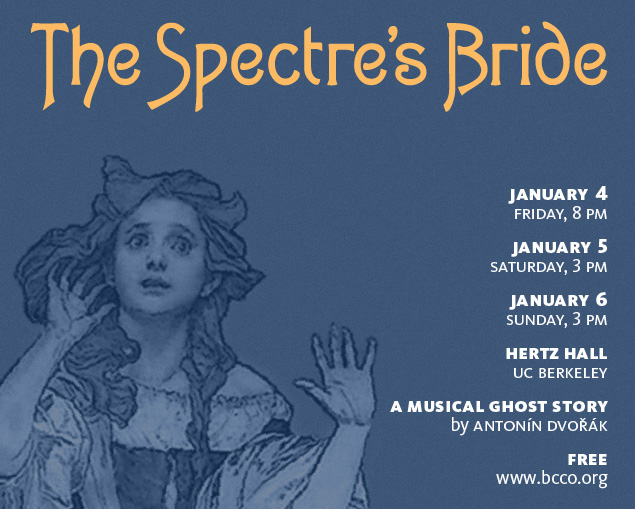
Dvorak’s Music Eloquent in Ghost Story
BERKELEY—To revive an excellent but forgotten oratorio by Antonin Dvorak, it took not the professional players, nor the downtown arts centers, but rather a thoroughly committed community orchestra and chorus to present “The Spectre’s Bride” of 1885.
Dvorak’s prowess at high drama, compelling orchestration and choral writing as an integral component of story-telling was never more effective than in this evening-length Bohemian-Czech fairy tale about a damsel in distress bedeviled and abducted by a specter in the night. Coming in the form of her late husband-to-be, the specter is partly the embodiment of Death, partly Mephistopheles, with his castle conveniently situated in a spooky cemetery, all stemming from a Czech folk tale collected by poet Karel Erben. To add to the terror, the maiden is entombed with a cadaver that comes to life. She escapes him and, using her wits, escapes the specter as well.
Echoing many such ghost stories from various countries (including the USA, where we had Poe and Washington Irving), this ghost story makes for the perfect deeply romantic concert piece, calling on three vocalists to portray the bass narrator and the couple.
Before it was half over, you wanted to fasten your seat belt to prevent the specter from scooping you up too while riding off into the midnight gloom.
The vivid imagery encompassed cocks crowing, bells chiming, dogs howling, and assorted “graveyard fiends” best left to the imagination.
The vocal writing ranges from the menacing growls of the specter—for once a devil who is a dramatic tenor, not a bass—to the luminous prayers voiced by the tremulous damsel, a soprano who also has the focal role. Some tenor-soprano duets spark the score, but nothing as much as the huge chorus part, which provides theatrical impetus even more than commentary, exuberantly voiced by 130 or so Berkeley singers—sometimes folksy, sometimes properly hellish.
They did not provide major articulation, but certainly the needed thrust. And Conductor Ming Luke, who is also leader of the Merced Symphony, held them together with aplomb.
Soprano Julia Metzler injected sensitivity memorably into the focal role, battling the bluster of the specter. The latter was played by Christian Ketter, who pushed his voice repeatedly into overdrive. The Narrator was André Chiang, whose sinewy baritone rattled the rafters of Hertz Hall.
The community orchestra was a workmanlike ensemble, sparked with memorable solos by flutist Sarah Holzman and clarinetist Dan Ferreira.
This was a true discovery. Veteran Bay Area concert-goers and critics encountered could not recall any previous Bay Area performances of this vibrant Dvorak opus since the mid-20th-century. And since it’s in Czech, requiring some 15 weeks’ rehearsal by the Berkeley Community Chorus, programming it is a laborious challenge, superbly met by the adventurous BCCO. We also learned an expression in Czech, buch-buch-buch, conveying the menacing villain’s bang-bang-bang on the maiden’s door.
The original Czech title hardly suggested pulse-quickening drama: Svatebni kosile , or “Wedding Shirts.” And no starch, please!
Berkeley Community Chorus and Orchestra under Ming Luke’s baton in Antonin Dvorak’s “The Spectre’s Bride.” Hertz Hall, UC Berkeley, Jan. 4-6. Free. For info: www.bcco.org